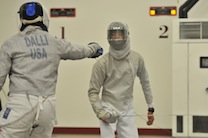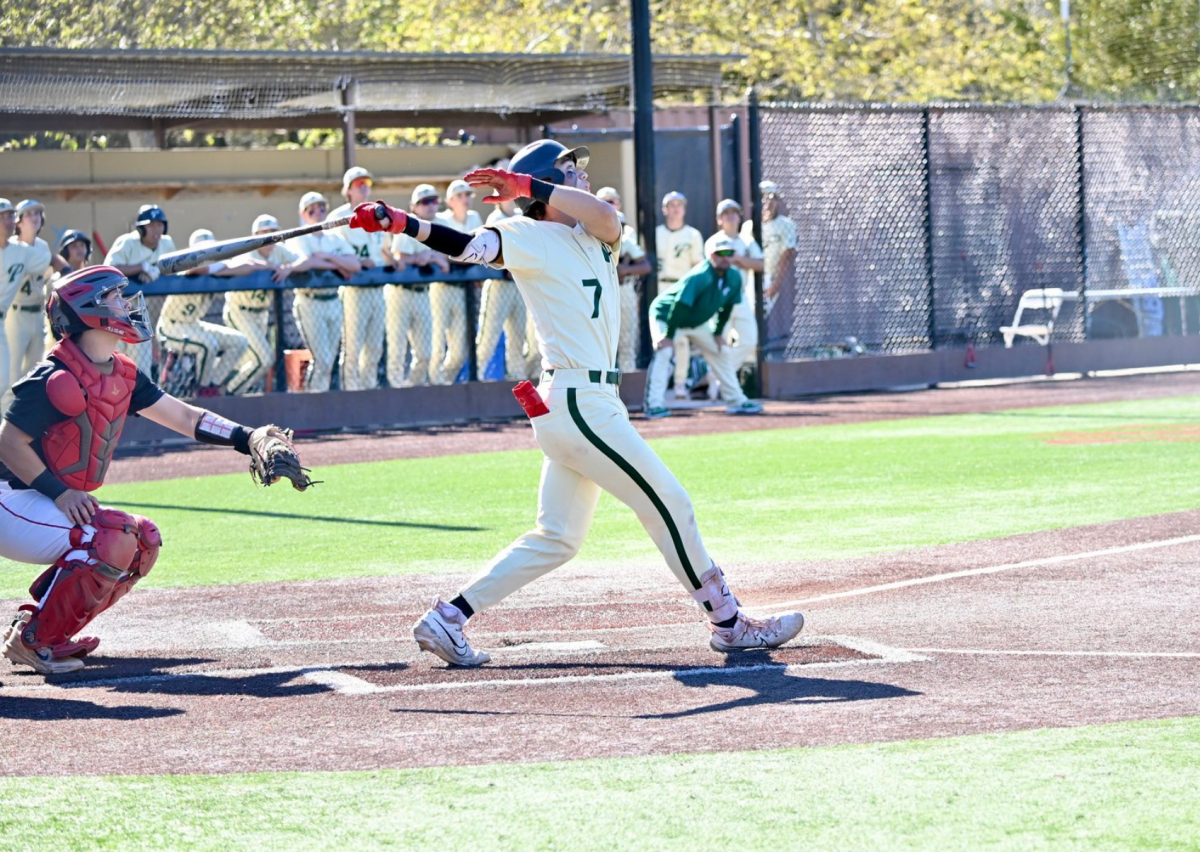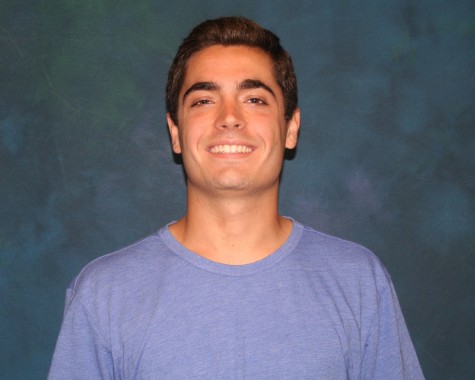
Pressure is something that many Paly students are very familiar with. Between the pressures of keeping a high GPA, fitting in with friends or getting into a quality college, students at Palo Alto High School face a lot of stress. For a certain student, however, there is an even greater pressure. A pressure that few people, let alone high school students, could handle. Royce Wang (‘15) is that student. His pressure? To maintain his ranking as 22nd in the world in Sabre fencing, for his age group.
Continuing on his current success, Wang may reach the highest pinnacles of his sport. As of now, however, Wang is solely focused on just improving his skills in the sport that he loves.
Wang first started fencing when he was nine, and ever since he first picked up a sword, he has been enamoured with the sport.
“It’s a hobby because I enjoy fencing and the physical thrill, the pressure and the fear of getting defeated,” Wang said.
Wang’s style and weapon of choice is known as, Sabre. In Sabre fencing, everything above the waist, excluding the hands of the Sabreur, is a valid area to earn points. Cutting, hitting your opponent with the side of the sabre and jousting your opponent with the point of the sabre, is allowed. It is a faster style of fencing that, according to Wang, is much more exciting to execute.
Wang believes that fencing stands out from other sports because of the mental and physical intensity fencing requires.
“It requires mental training and physical endurance, and you have to know what you’re doing in every moment, so you can face your opponent without being defeated,” Wang said.
Mental training, such as playing simple games. They games are designed to increase a fencer’s concentration, decision-making, and reflexes. Although these games are simple, they are the building blocks for winning matches and becoming internationally ranked.
Sasha Lepiashinski, Wang’s coach at the Cardinal Fencing club, echoes Wang’s thought on the sport.
“People call fencing physical chess; what does this mean?,” Lepiashinki said. “It means to be a good fencer, you have to be strong athletically, have a good upper body, plus be very, very smart. It’s the combination of physical traits and mental traits.”
Former teammate Rafael Viluan started fencing around the same time Wang started; although they are on different teams now, Viluan says that Wang’s work ethic has not changed.
“He’s been fencing since he was nine, and he shows up to practice every day, for the entire week,” Viluan said.
Lepiashinski believes that this method of deliberate training is the only way that Wang, or any other fencers, can get better.
“The way to reach a high level fencing, it’s hard work,” Lepiashinski said. “Of course, the highest level of fencers in the world have a combination of talent and hard work.”
There is a common theme at Cardinal Fencing, the club that Wang fences for. Almost all of the coaches and students compete on the highest international level. Lepiashinki, for example, is a twelve-time Champion of Belarus, has coached World-Cup winner and Olympic finalist, Dmitry Lapkes and coached at the National Olympic Center. Walking around the fencing facility located at the Arrillaga Center for Sports and Recreation on the Stanford campus are Olympic fencers representing Panama, Spain and Ukraine. But Wang is not shell-shocked, seeing these men and women who have reached the highest pinnacles of his sport, because he has been there before.
Earlier this year, Wang finished at nineteenth in a tournament in Godollo, Hungary, an extremely difficult match that he anticipated doing poorly in. Wang then went to the fencing World Cup in Konin, Poland, where he finished eighth, earning a spot on the podium. But according to Wang’s dad, Regal, Wang almost was not there to earn his trophy.
“He was asleep in the hotel room when his coaches called him, asking where he was and telling him that he needed to get down to the podium as soon as possible, he needed to be there,” Wang’s father said.
Despite constantly competing at a high level of fencing, Wang still comes off as an incredibly easy-going guy. At practice he is often seen joking with his practice partner, constantly with a smile on his face. But as soon as he pulls on his mask, he is all business.
Viluan says that Wang has been that way ever since he began the sport.
“He is more quiet and focused when he’s fencing, he’s thinking about his next move,” Viluan said. “[Off the court] he’s really hyper, definitely a lot more easy-going.”
It’s this rare combination of personality and focus that has led Wang to success, both nationally and internationally and will lead him to success in the future.
Wang hopes that fencing will help with the college process, but he also realizes the benefits that fencing gives to him now.
“It can help you get into college because fewer people do it, so it’s easier than some other sports to do collegiately,” Wang said. “To be real good and compete in that small circle, you have to be well rounded in all of your actions. From each of your defeats, you can learn a lot. Like not being over confident, and being able to come back from your failures and learn from your mistakes.”
Wang’s training and personality has got him to a high level of fencing, but Lepiashinki believes he can take himself even further.
“His potential is very, very high,” Lepiashinki said. “Everything depends on him. He has great facility [at Stanford], we have very good and experienced coaches. He can reach very high international level. In Poland, it was World Cup and he got tenth place, which is not bad.”
Wang may be a long way off from his goal, but he is getting closer to it. Still, the pressure is on him to become the best that he can become. But Wang not only enjoys the pressure, but he thrives off of it.
“It motivates me to do better,” Wang said.
More than anything, Wang competes in fencing because of the feeling he gets when he fences.
“You feel pressure but it feels good because you’re in your own little space inside your mask,” Wang said. “When you win, you feel a great sense of relief and accomplishment.”






